My in-laws’ post-Partition travails and resilience
Category:
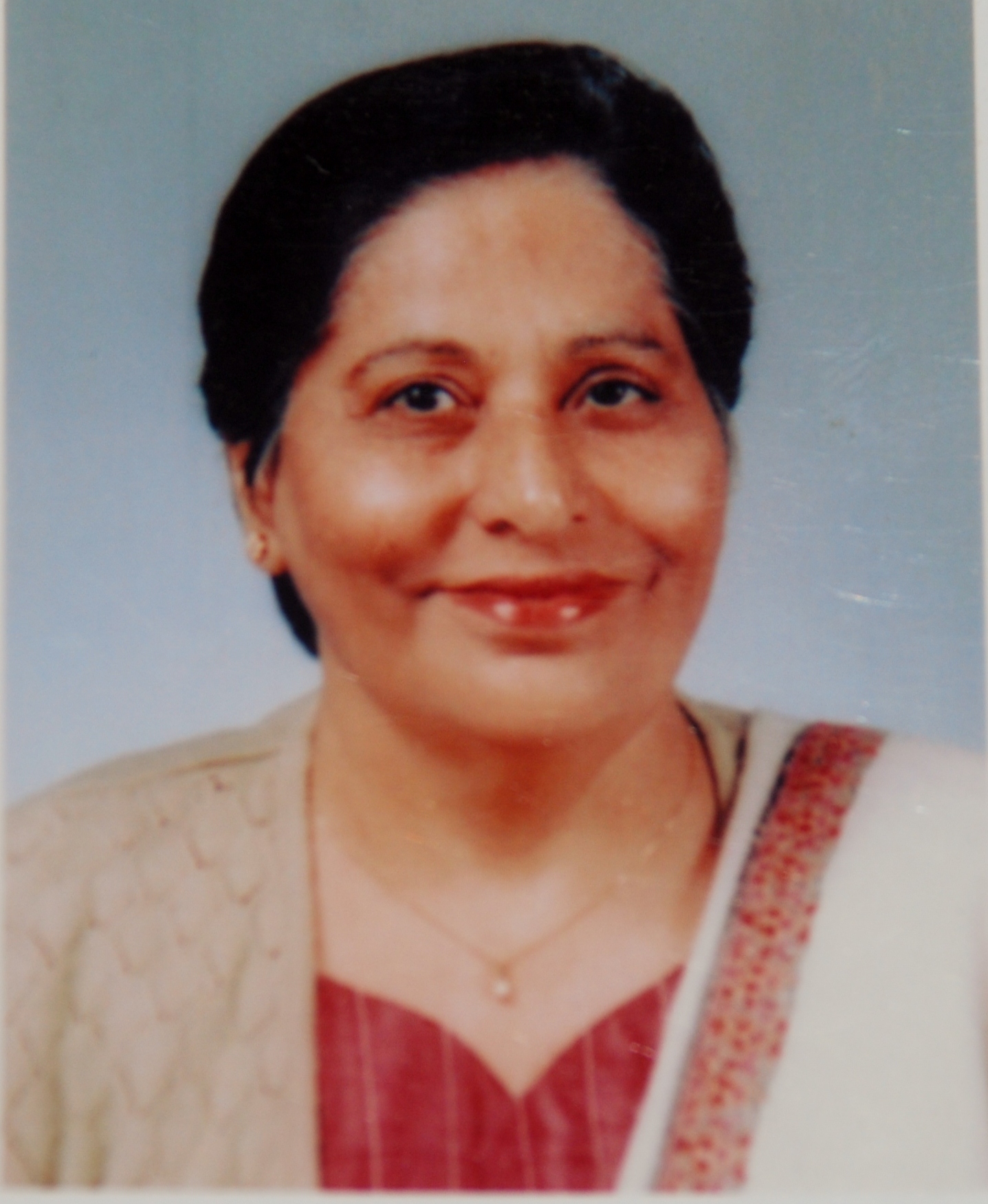
Bimla Goulatia got her doctor’s degree (MBBS) from
Editor's note: Mr. M. P. V. Shenoi has facilitated the writing and publication of this story.
Like many Hindus who were living in West Punjab at the time of partition of India in 1947, my parents had crossed over to truncated East Punjab, losing most our assets. My father had been rehabilitated as a professor in the Government College, Hoshiarpur. With the help of some friends in Pakistan, he had been able to bring back some family assets. Ed. note: her story of the family's move is available here and her brother's story is available here.
Life had slowly returned to normal. Over time, the bitter memories of loot, living in camp, travelling to India in an overcrowded train, and witnessing death and desolation all along the railway track had faded. In 1967, I got married to Dr. Rajinder Goulatia.
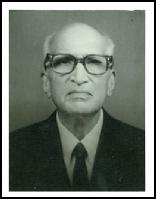 My father-in-law, Dr. R.C. Goulatia (Pitaji) and his wife (Mataji) had four children. My husband, Rajinder, is the youngest. His sister Savitri is the oldest\; as an M.A. student, she was arrested in 1942 for participating in the Quit India movement. Twin brothers Romesh and Somesh (who were born in 1928) are in between Savitri and Rajinder. Romesh and Somesh grew up into handsome young men, expert in swimming, boxing and wrestling - but their lives were tragically short.
My father-in-law, Dr. R.C. Goulatia (Pitaji) and his wife (Mataji) had four children. My husband, Rajinder, is the youngest. His sister Savitri is the oldest\; as an M.A. student, she was arrested in 1942 for participating in the Quit India movement. Twin brothers Romesh and Somesh (who were born in 1928) are in between Savitri and Rajinder. Romesh and Somesh grew up into handsome young men, expert in swimming, boxing and wrestling - but their lives were tragically short.
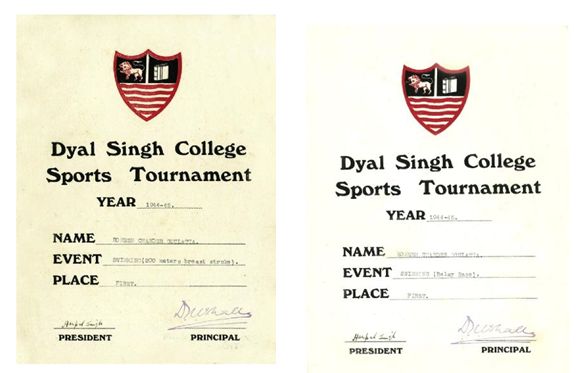 Soon after my wedding, I learnt what my husband's family, like mine, had suffered in those unfortunate times. Even 20 years after Partition, his wounds were raw, and his narration of those days was so painful for both of us.
Soon after my wedding, I learnt what my husband's family, like mine, had suffered in those unfortunate times. Even 20 years after Partition, his wounds were raw, and his narration of those days was so painful for both of us.
It has been almost over 60 years since those tragic events happened and we both have kept everything bottled inside us. I have now decided it is time to share it with the world.
In 1923, Pitaji was granted a Short Service Commission in the Royal Medical Corps. While in service, he realized that Indian doctors with Indian medical degrees were not eligible for absorption in the service on a Permanent Commission, even though there was an acute shortage of doctors. Permanent Commission was reserved for British or European qualified doctors only.
In disgust, in 1927, when he had become a Captain, Pitaji resigned his job. He took up this matter of blatant discrimination against Indian qualifications with Swaraj Party, which was then fighting for the dignity of Indians. Ultimately, Indian degrees were also made an acceptable qualification for the grant of a Permanent Commission.
After leaving the Army, Pitaji started his Radiology practice in Lahore at Nisbat Road. He was elected as Vice President of the Indian Medical Council, and a member of working committee of the All-India Medical Association.
It was common practice for well-to-do families, such as my in-laws, to spend their summer vacations in hill stations. Mataji and her three sons had gone from Lahore to Mussoorie a few months before the partition.
In August 1947, the law and order situation deteriorated rapidly in Lahore, and non-Muslims were forced to leave. So, Pitaji moved to Delhi while his family was still in Mussoorie.
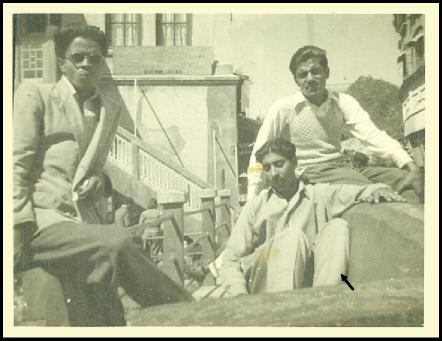 Somesh, 19 years old, was selected by the Royal Indian Air Force to undergo training as a Pilot. He left Mussoorie for Coimbatore in September 1947, but Romesh stayed on in Mussoorie.
Somesh, 19 years old, was selected by the Royal Indian Air Force to undergo training as a Pilot. He left Mussoorie for Coimbatore in September 1947, but Romesh stayed on in Mussoorie.
Since there did not appear to be any possibility of returning to Lahore, which was now part of Pakistan, Pitaji asked Romesh to look for a suitable house either on rent or on outright purchase in Mussoorie itself.
On October 11, 1947, Romesh had gone for lunch at a friend's house. There he talked about renting or buying a house in Mussoorie, as instructed by Pitaji. His friends told him that there was a bungalow, near Vincent High School, belonging to Muslim doctor from Lahore located.
Romesh and his two friends went to see this bungalow. Romesh went ahead and pressed the call bell. There was no response. He turned the door handle to make sure that the house was locked. Immediately, there was a blast and the heavy door fell on him. His friends got scared and ran away, leaving Romesh to his fate.
Later, in the evening, the same friends came to Mataji and asked about Romesh. She was taken aback that they were asking her because Romesh had gone with them for lunch. She confronted them with this fact. Then they blurted out that there was an accident near Vincent Hill School. Mataji and Rajinder were stunned. They went to the police station, and the Deputy Inspector General and Superintendent of Police went with them to the site of accident.
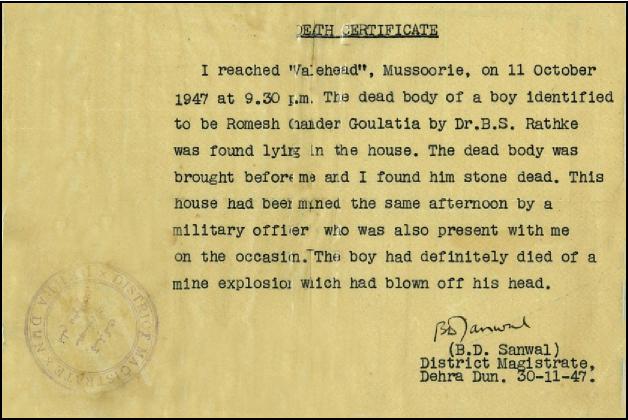 Mataji could not bear to go ahead. Rajinder, aged 12 years, went ahead and saw Romesh smeared with blood and lying still. There was a big wound on his chest. A policeman turned the handle of the next room in the same house. There was another blast - he was lucky because he was hit in the leg, and survived.
Mataji could not bear to go ahead. Rajinder, aged 12 years, went ahead and saw Romesh smeared with blood and lying still. There was a big wound on his chest. A policeman turned the handle of the next room in the same house. There was another blast - he was lucky because he was hit in the leg, and survived.
The Police collected Romesh's body, and showed it to Mataji by a torch light during the night. Mataji demanded and requested them to hand over the body to her, and inform Pitaji for which she offered to pay the expenses. But, her request fell on deaf ears. Imagine the condition of the mother and the young boy, with nobody to console or guide them.
The police cremated Romesh at Rajpura 13 kms away from Mussoorie near a nalla. Mataji and Rajinder were not even allowed to be present at the cremation. There was no post-mortem and no investigation.
Next day, there was news of a third explosion when a servant touched the door of a house that belonged to an English lady, who was in a hospital at that time.
There was fourth explosion in another house after three or four days.
It was only then that the public was informed by a Public Address system. The vacant houses of the Muslims who were in relief camps had been booby trapped with the help of the Army on the Government's order. The idea was that nobody should occupy the vacant homes.
The booby traps were a guarded secret. Only the senior police officers knew about. Little did anyone know that this would cause the deaths of Romesh and other innocent people. The officials wanted to hush up the matter, and that is why they cremated Romesh at dead of night, and acted in a callous and highhanded manner. It is matter of great shame and sorrow that such a thing happened in our own independent country, and that too to an educated, patriotic family.
Pitaji wrote letters to Mahatma Gandhi, Pandit Jawahar Lal Nehru, and the U.P. Government for illegally booby-trapping the vacant Muslim properties without informing the public or putting any sign of "Danger" on the properties. The Medical Associations of Mussoorie, U.P., Kanpur, Lucknow and Delhi all condemned the treatment and behaviour of U.P. police for not handing over the body of Romesh, not informing the father at the request of mother on her cost, cremating the body in dead of night like a lawaris (a person who has no relatives and the body remained unclaimed), and setting booby traps without informing the public or displaying any warning sign.
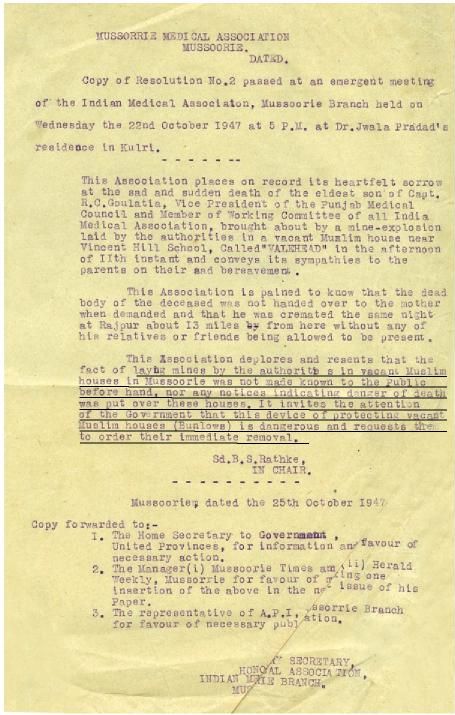
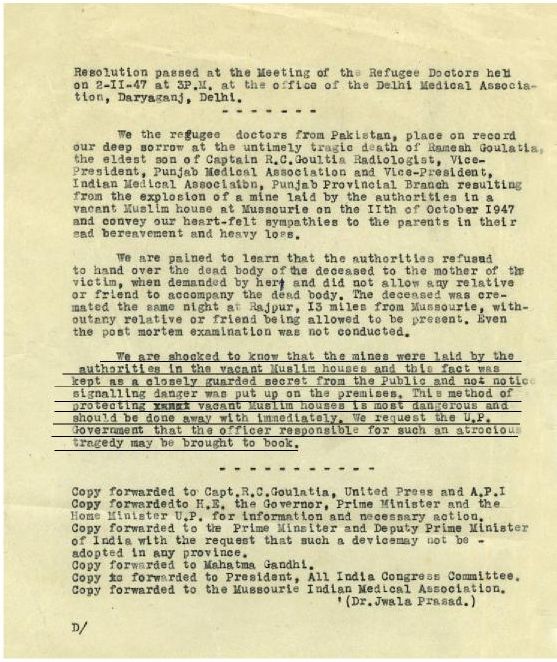
Pitaji and the family got no reply or relief.
Dejected and depressed, Pitaji, Mataji, and Rajinder shifted from Mussoorie to Delhi. They stayed with Pitaji's friends for two months. They stayed in eight different places in makeshift rooms till 1950, while Pitaji established his medical practice.Somesh got his Permanent Commission in the Indian Air Force in 1950. He was selected for fighter planes (Spitfire) and posted at Ambala. Somesh had overruled his mother when she objected to his joining the Air Force. He had pleaded, "Please tell me, mother, which child is not loved by his mother as you love me. Also, which is the family in which the son is not precious so that I can send him in my place? I have been always taught by Pitaji to sacrifice everything, even my life, for the Country. So why should you prevent me from doing duty for the Country especially when young men are needed by Air Force for the defence of the country?"
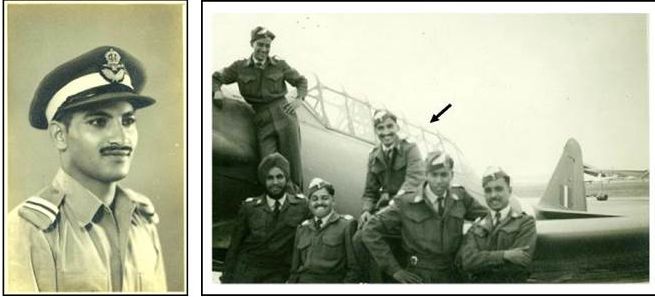 Mataji had no answer. So she blessed him, and allowed him to join the Air Force. Our sorrow is that he did not live long to fulfil his ambition to serve the motherland.
Mataji had no answer. So she blessed him, and allowed him to join the Air Force. Our sorrow is that he did not live long to fulfil his ambition to serve the motherland.
In July 1950, he was to collect a motorcycle from Delhi. But destiny had something else in store. On July 8, 1950, an Air Force Officer came to the clinic in Delhi to tell Pitaji that his son Pilot Officer Somesh Goulatia had met with a fatal plane accident. Pitaji asked the Officer if he was in his senses. The word "fatal" never registered with him.
Pitaji, Mataji and Rajinder rushed to Ambala the same day. Pitaji wanted to see the body in spite of being told that Somesh's face and head had been badly crushed. He saw the body. Somesh was cremated with full military honours. Pitaji kept his courage and cool thanked everyone present there. Letters of condolence poured from all over. Even the Prime Minister of India Pandit Jawahar Lal Nehru sent a letter of condolence in his own handwriting.emise of Pilot Officer Somesh Chander Goulatia, the family lost a loveable child, the Air Force lost a really promising officer, and the nation lost a patriot. Our sorrow is that he did not live long to fulfil his ambition to serve the motherland.
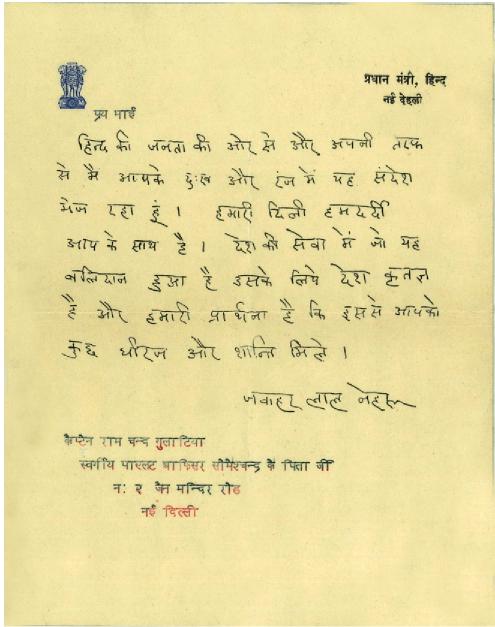 Pitaji had to bear the sorrow of losing two of his sons, who escaped the killings in Pakistan but died in free India. Pitaji sought refuge in busying himself to serve other displaced doctors and creating old age homes. Out of 1,200 displaced doctors who had come from what was now Pakistan, the Government agreed to give houses and places of practice to only 120 doctors. Pitaji saw to it that all of the 120 doctors got a place to live and practice before he got one for himself. He worked hard for the collection of funds and construction of Delhi Medical Association (DMA) building in Daryaganj, Delhi. Along with Major General Amir Chand, he got the office of Indian Medical Association (IMA) shifted to New Delhi.
Pitaji had to bear the sorrow of losing two of his sons, who escaped the killings in Pakistan but died in free India. Pitaji sought refuge in busying himself to serve other displaced doctors and creating old age homes. Out of 1,200 displaced doctors who had come from what was now Pakistan, the Government agreed to give houses and places of practice to only 120 doctors. Pitaji saw to it that all of the 120 doctors got a place to live and practice before he got one for himself. He worked hard for the collection of funds and construction of Delhi Medical Association (DMA) building in Daryaganj, Delhi. Along with Major General Amir Chand, he got the office of Indian Medical Association (IMA) shifted to New Delhi.
Pitaji worked for the betterment of the working conditions of doctors, and he pressed for better facilities for doctors working in rural areas. He continued this type of work for the rest of his life. He spent the last 16 years of his life in providing medical facilities to the aged. For this purpose, an Elders Home society was formed in 1979, and registered under the able guidance of Late Dr. (Mrs.) S.J. Nand. It is now Elders Home cum Hospital &\; Research Centre at Rohini, Delhi.
Rajinder was very dejected and depressed after losing both his older brothers, when they were only 19 (Romesh) and 22 years (Somesh) years old. Both were his ideals, and he used to follow them like a shadow. He lost interest in life and studies. He felt a void. He too wanted to join Army, which his parents would never permit - he was their only remaining son. He felt so lonely in life.
One of Rajinder's friend and class fellow, the late Dr. K.L. Taneja, solaced him, motivated and coaxed him to get ahead with life. He started focusing on studies and became a doctor. He did his post-graduation in Radiology at the All-India Institute of Medical Sciences (AIIMS), Delhi, a premier medical institute in India. He set up the department of Neuro-Radiology there and became a pioneer in Neuro-Radiology in India. In 2012, he was honoured with a Lifetime Achievement Award in Neuro-Radiology by Neurocon-2012 organizing committee in the First Indo-German Neuro Surgical Conference at the 61st Annual National Conference of Neurological Society of India.
Epilogue
I was a child when my family left our home in 1947 from what became Pakistan. We did not comprehend the monetary and other losses families suffered during partition. Fortunately, my family came out of the terrible calamity intact - none of us died in the upheaval. But life has to go on. My father understood it. Setting aside the losses, the family suffered, he would say to us "जान है तो जहान है (Jaan Hai To Jahan Hai If you have your life, you have the world.)" He would urge us to move on and carve a future for ourselves.
Look at my husband's family. They lost their assets in Pakistan and they lost their beloved ones. I admire their resilience - how courageously they faced adversities and continued to work to help others. When our sons Amit and Ashish were born, the family felt they got their lost sons back.
I feel every human being has so much potential. By tapping that potential, people can gather what remains after a tragedy, restart life, and strive for a better future.
© Bimla Goulatia 2014
Comments
Add new comment